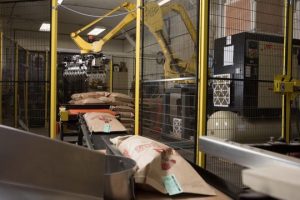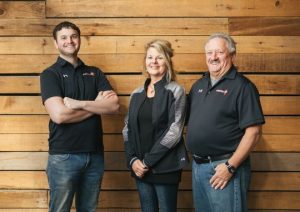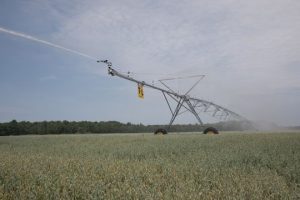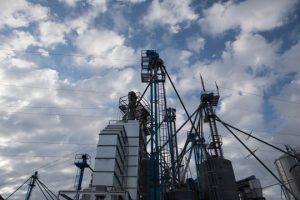Schumitsch Seed, Inc.

Seed Oat Processor Helps Potato Growers
What was once a quaint seed oat cleaning operation owned and operated by a lone potato farmer in Antigo, Wisconsin, has evolved to become a sizable rotational crop specialist for almost every potato farm in Langlade County.
Schumitsch Seed Inc., situated on the southwest outskirts of Antigo, has survived through three generations and continues to grow and partner with potato farmers in helping them succeed with their rotational crops.
Although Schumitsch Seed doesn’t currently do any farming, it is engrained in its history. Joe Schumitsch moved to the outskirts of Antigo in the 1940’s, at Schumitsch Seed’s current location, where he built and maintained a simple dairy operation.
Lester Schumitsch, Joe’s son, continued to farm the location in the years after Joe had passed and started growing potatoes on the land, phasing out dairy farming.
In 1962, Lester purchased a Clipper grain cleaner and the seed oat business began. He started out with just his own oats at first and did well selling the seed.

A robotic stacking arm, named “Lester,” stacks seed oats onto pallet at Schumitsch Seed Inc. (Photo: Courtesy of Travis Dewitz)
Lester picked up a few good distributors and demand soon outweighed supply. When the neighbors caught wind of what Lester was doing, they also started growing seed oats for him to clean and sell as part of their potato rotations.
Fast-forward through the late ’70s and ’80s, and Scott Schumitsch, the youngest of Lester’s three sons, expanded on the seed business, taking on many more potato farmers’ oats as they moved to three-year rotations.
Lester eventually sold the farmland, and every building on the property was retrofitted to either store seed oats or hold all the grain cleaning equipment. Business was moving right along, but eventually hit tough times in the late ’80s.
Poor growing years
“The combination of some really poor growing years filled with drought in ’88 and ’89, along with poor markets for the seed had me upside down. I was going through some tough times,” Scott relates.
“I met with the potato growers at the time, telling them my situation and how I was going to call it quits, but they basically told me that they weren’t going to let me quit and would pull me through,” he says.
With the financial support of the local potato growers, Scott was able to make it through those tough times.
He spent the 1990’s figuring out how to make his business model work without having to fall back on the financial dependence of local farmers, while at the same time bringing them as much value as possible for their crops.
He reinvested year after year in expanding his storage, as well as the first phase of oat milling, or what is called “dehulling.”
“Essentially, oats are a nutritious grain for feeding livestock or for food, but the husk or hull is largely inedible fiber. To hit most good end-use markets, the hull needs to be removed,” Scott says.
“For instance, all oatmeal that is consumed by humans has gone through a process to remove that hull,” he adds. “It’s an expensive process that is largely ‘secretive,’ and there is a big learning curve to the art of doing it correctly.”
A leg up
“I was fortunate enough to be able to partner with some people in the industry that gave us a leg up. One company was particularly helpful to us,” Scott remarks.
“They were, and continue to be, a good-sized commercial oat mill for human-consumption oatmeal, and we supplemented their milling needs while they were going through growing phases in the 2000’s,” he explains. “They cut a lot of our learning curve and gave us some important tips and knowledge.”

Three proud proprietors of Schumitsch Seed Inc. include, from left to right, Jay, Penny and Scott Schumitsch. (Photo: Courtesy of Travis Dewitz)
In the early ’90s, when Schumitsch first started processing, or dehulling, oats, they weren’t efficient. “It would take us anywhere from 35 to 45 hours to make a load, or 50,000 pounds of finished product,” Scott admits. “It’s remarkable to think about that.”
“Today, with all of the improvements we’ve made, we can make a load in under three hours,” he says. “We made maybe 20 loads per year of dehulled oats in the early ’90s, and last year alone we produced 750 loads.”
Besides dehulling oats, Schumitsch has tried other grains and crops over the years to see if there were more valuable rotational crops for potato farmers to grow besides oats.
They tried winter wheat for many years in the 2000’s. Scott developed a market for a soft winter wheat that would end up in granola bars. The payback for the farmers was great and everything looked good on paper.
But it brought up a host of other issues that eventually made them give it up. If it wasn’t problems with large losses due to winter kill, then it was problems with mycotoxins in the grain putting the levels beyond what could be sold for human consumption and having to sell it off at a fraction of the price.
Focus on oats
Eventually, after several years of trying new growing techniques and failing to come out ahead with winter wheat, the farmers and Schumitsch decided to focus solely on oats.
It isn’t just wheat they’ve tried growing over the years, but also sunflowers, soybeans, barley and corn. Each has its own host of issues that they learned from and always ended up going back to oats.
“We’ve been doing this for so long and have tried many things, but in this area and because of how these seed potato growers have to farm, oats just always seem to work best,” Scott says.
Today, Schumitsch Seed is welcoming the next generation. Jay Schumitsch, Scott and Penny’s only son, has taken a large interest in the business since he was a child.
“When I was in high school, I was able to get into a cooperative program to leave school early to go to work around 1 p.m., and run the mill until 9 o’clock every night,” Jay says.
“It was important to learn day-to-day operations and the ins and outs of running the machinery in the mill,” he explains.

Valuable Antigo foundation seed oats are watered at Schumitsch Seed Inc. (Photo: Courtesy of Travis Dewitz)
Jay has inherited a large portion of Scott’s previous duties running the business, while Rick Wild has taken over Red Robin Seeds (the seed brand of Schumitsch).
Side projects
Scott mainly focuses on side projects. In addition to serving on the Board of Directors for the Wisconsin Crop Improvement Association, he also works with the University of Wisconsin on developing better oat genetics.
One of the biggest problems they see in today’s varieties is lack of test weight. “For years there has been a large emphasis on creating varieties with a high yield, but not really on test weight. Without test weight, you don’t have a valuable oat,” Scott states.
“All of the nutrition and feed value is in the groat [hulled kernel], and generally the lighter the test weight, the higher the proportion of hull to groat. Neither commercial oat mills nor feed mills want light test weight oats-there is just no value to them,” Scott says.
The University of Wisconsin has recently hired a new plant breeder, Lucia Gutierrez, who is enthusiastic about bringing in newer, improved varieties to Wisconsin farmers. She understands the lack of good high-quality Wisconsin oat genetics and is working diligently to fix this issue.
“I’ve talked to guys who have been in crop sciences for decades focusing on oats. They’ve met with Lucia and have had great discussions with her. They’re always impressed by her wide array of knowledge and are excited about the talent and value she is going to bring to the Wisconsin farmer,” Scott relates.
Meanwhile, back at the plant, Jay focuses on plant efficiencies as well as continuously searching for new end-use markets for the oats they process.
“I’ve made a lot of new friends in the industry,” Jay says. “I’ve even traveled overseas to take a course on milling oats from start to finish.”
Oat-milling world
“The oat-milling world is a very small group of people,” he allows, “but every one of them that I’ve met so far has been a good-intentioned and kind person. I’m excited to work in this industry for years to come.”
Jay says there is a lot of value to the oats that local potato farmers grow. “I know there is a lot of value in what these guys do. The key is going to be finding that perfect niche,” he says.
“I picture us turning into a highly specialized farm-to-table operation. We have the ability to one day separate each farm’s oats into separate bins/lots and run them in small batches, what the industry refers to as ‘identity preserved grains,'” Jay continues.
“We can package their oatmeal into small packages and tell each farm’s story on the back of the oatmeal package. Consumers love that story, and it’s something unique to us and our area,” he adds.
Unfortunately, right now, Schumitsch Seed lacks a lot of the expensive equipment to make this happen. However, Jay is excited and ambitious about the future. Through years and reinvestments, one day he believes they’ll reach this goal.
“I have a lot of years to continue to build and expand upon what my dad and grandpa have taught me,” he remarks.

A sky view of Schumitsch Seed Inc. shows bucket elevators and bins. (Photo: Courtesy of Travis Dewitz)
“I will always remember that the only reason we’re here today, supporting 12 full-time employees with good-paying jobs, is because of the backing of our local potato farmers through tough times,” he stresses. “It’s truly a remarkable and inspiring story that I’ll forever be grateful for.”
Joe Kertzmam is the managing editor of the Badger Common’Tater
Source: Wisconsin State Farmer

